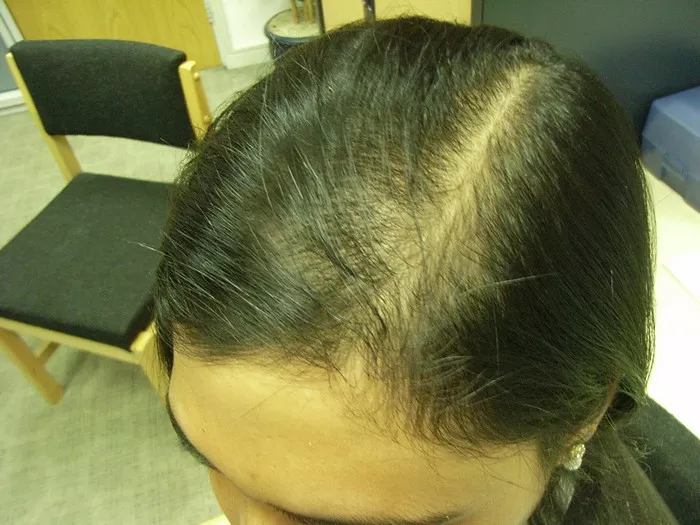For individuals experiencing hair loss, establishing a proper hair care routine becomes crucial in maintaining hair health and minimizing further damage. A key question that arises is how often one should wash their hair to strike the perfect balance between cleansing the scalp and preserving the hair’s natural oils. In this comprehensive guide, we explore the factors influencing hair washing frequency for those with hair loss concerns. By understanding the nuances of hair care and individual needs, you can embrace a personalized approach that promotes healthy, resilient, and beautiful hair.
What is Hair Loss?
Hair loss, also known as alopecia, is a common condition characterized by the gradual thinning or loss of hair from the scalp or other parts of the body where hair normally grows. It can affect both men and women and may result from various factors, including genetics, hormonal changes, medical conditions, medications, and certain lifestyle habits. Hair loss can range from mild to severe and may lead to a decrease in hair density, patches of baldness, or widespread thinning. While some hair loss is a natural part of the hair growth cycle, excessive or premature hair loss can be distressing and may require medical attention.
What is the Cause of Hair Loss?
Hair loss can be caused by a variety of factors, and the underlying cause can differ from person to person. Some common causes of hair loss include:
1. Genetics:
Family history plays a significant role in hair loss. If you have a family history of pattern baldness (androgenetic alopecia), you are more likely to experience hair loss as well.
2. Hormonal Changes:
Hormonal imbalances, such as those occurring during pregnancy, menopause, or thyroid disorders, can lead to hair loss.
3. Medical Conditions:
Certain medical conditions like alopecia areata, scalp infections, and autoimmune diseases can cause hair loss.
4. Physical or Emotional Stress:
Significant physical or emotional stress can trigger a condition called telogen effluvium, leading to temporary hair loss.
5. Nutritional Deficiencies:
Inadequate intake of essential nutrients like iron, zinc, biotin, and protein can affect hair health, leading to hair loss.
It’s important to consult a healthcare professional or a dermatologist to accurately diagnose the cause of hair loss and determine the most appropriate course of action for treatment and prevention.
Is there a relationship between hair loss and shampooing?
There is a relationship between hair loss and shampooing. The frequency and method of shampooing can impact hair health and hair loss. Over-washing or using harsh shampoos can strip the scalp of its natural oils, leading to dryness, irritation, and potential hair breakage. On the other hand, infrequent washing may result in the buildup of oil, dirt, and product residues, potentially clogging hair follicles and hindering healthy hair growth. Finding the right balance is crucial.
How Often You Should Wash Hair If You’re Losing Hair
If you’re experiencing hair loss, determining how often to wash your hair is essential in maintaining scalp health and promoting hair growth. Washing frequency can vary depending on individual factors. Generally, individuals with hair loss concerns should aim to wash their hair every 2 to 3 days. Frequent washing can help remove excess sebum, debris, and impurities, preventing clogged hair follicles and promoting a healthier scalp environment. However, avoid over-washing, as it may strip the hair of its natural oils, leading to dryness and potential damage. Listen to your hair and scalp needs, and consider using gentle, sulfate-free shampoos to maintain hair health.
Strategies for Optimal Hair Washing Frequency
Optimal hair washing frequency depends on various factors, including hair type, scalp health, and lifestyle. Here are some strategies to help you determine the best washing frequency for your hair:
1. Listen to Your Hair and Scalp
Pay attention to how your hair and scalp feel after washing. If your hair feels excessively oily or your scalp becomes itchy and irritated between washes, you may need to adjust your hair washing frequency accordingly.
2. Consider Alternative Hair Care Practices
In between washes, consider alternative hair care practices, such as using dry shampoo to absorb excess oil and refreshing the hair. Gentle scalp massages can also help distribute natural oils and promote scalp health.
3. Use Mild, Sulfate-Free Shampoos
Opt for mild, sulfate-free shampoos that are gentle on the hair and scalp. Harsh shampoos can strip the hair of its natural oils, leading to dryness and potential damage.
4. Consult a Dermatologist or Hair Specialist
If you are unsure about the best hair washing frequency for your hair loss concerns, consider seeking advice from a dermatologist or a hair specialist. They can assess your scalp health and hair condition and provide personalized recommendations.
Conclusion
Determining how often to wash your hair when experiencing hair loss is a delicate balance that requires consideration of various factors, such as hair type, scalp health, and lifestyle. Striking the perfect balance between cleansing the scalp and preserving natural oils is essential in promoting hair health and minimizing hair loss. Listen to your hair and scalp, and don’t be afraid to experiment with different hair care practices to find the best approach for your individual needs. By embracing a personalized hair care routine, you can unlock the secret to resilient, beautiful, and healthy hair that radiates confidence and beauty.


